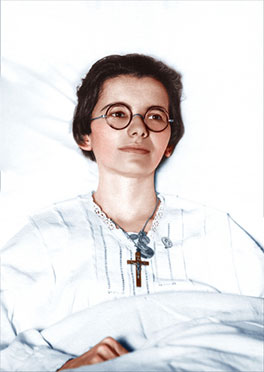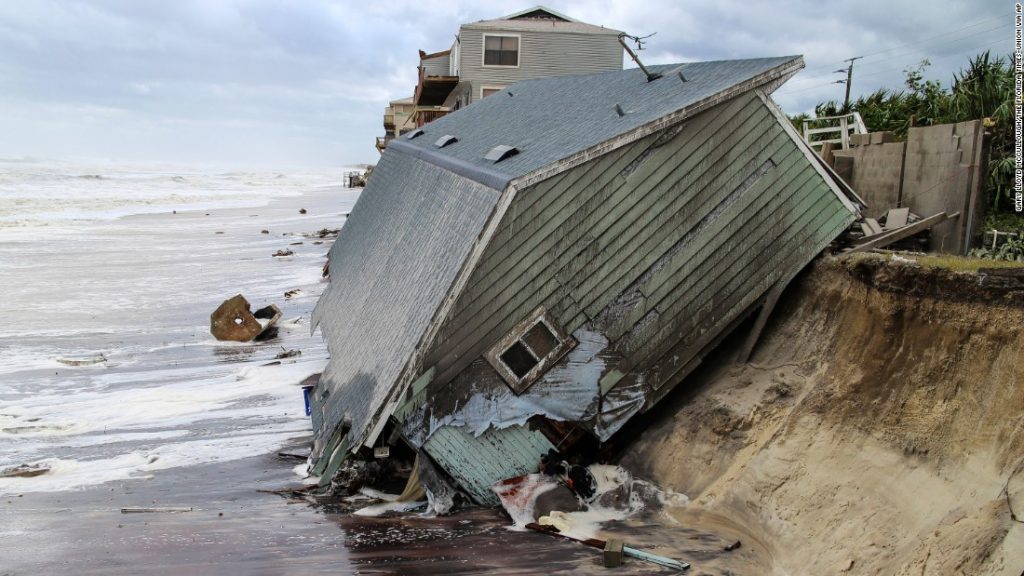For the last few weeks I have been thinking of the principle of entropy. Being a biology major in college and having to take chemistry and physics courses besides, years ago I studied the scientific principle of entropy, that is, a system’s tendency to become disorganized overtime. Basically, this law of nature says that unless acted upon by outside energy, a system will either have the same or more disorder as time passes. Lately, we certainly have seen this principle at work around us. Images from the recent hurricanes make us gasp at the extreme destruction and disorder caused by these forces of nature. Scenes from once beautiful and harmonious landscapes now appear ugly and in total chaos. And much, much effort and energy must be expended to put it all back together again.
Having lived through a natural disaster when my family home was severely flooded in Pennsylvania in the 1970’s because of the historic overflow of the Susquehanna River, I know what these people are living through. There was unbelievable chaos around us as my parents were relocated to a safer location in a trailer park several miles away. It took years to rehabilitate the area and extensive measures to return to normal living.
It doesn’t take much imagination to apply the principle of entropy to our spiritual lives as well. How often we find ourselves, “off-track” when we let our spiritual lives and thoughts drift along with the tenets of the world or when we are too busy, too self-absorbed, too tired, or too apathetic to apply the energy necessary to think about God and to invite the Sacred Heart of Jesus into our lives to straighten out any wayward tendencies. Remember: a system will never get more ordered without outside intervention, so we all need God’s help to live the type of spiritual, moral, honest existence that puts us on the right path to God’s Kingdom.
 An excellent article entitled “Repentance and Cleaning House” (see catholicgentleman.net) expresses how one Catholic father viewed the phenomenon of entropy in his own home and applied it to our spiritual growth. He writes:
An excellent article entitled “Repentance and Cleaning House” (see catholicgentleman.net) expresses how one Catholic father viewed the phenomenon of entropy in his own home and applied it to our spiritual growth. He writes:
I am the father of three children four and under. It is always startling to me, though it shouldn’t be at this stage, how quickly things can spin out of control. A perfectly clean house that took a great deal of effort to tidy up can nearly instantly be destroyed by our children with hardly any effort at all. Cheerios crunch under my feet as I gaze in stupefied awe at the explosion of food under our one-year old’s high chair. Pieces of Mr. Potato Head are unearthed in my sock drawer. Beds that were neatly made a moment ago are suddenly a tangled mess of blankets and sheets in no time at all. I could go on and on. It is as if a tornado sweeps through our home on a daily basis. It is the law of entropy experienced in all its brutal and chaotic reality. Yet, my wife and I both tend to crave order and neatness. We’ve tried, unsuccessfully, to just ignore it and let go. Maybe someday we’ll succeed. But for now we can’t. Each day, the house is nearly destroyed, and each day we begin again the futile task of picking up, wiping down, vacuuming, sweeping, emptying and organizing. It is a process that will never end—at least, as long as we have children in the house.
Musing on the fact of how quickly his tidy house descends into disorder and must be constantly cleaned, this perceptive Catholic Dad compares this to our souls which need constant vigilance and upkeep. There is, he explains, a spiritual law of entropy called sin. And each and every day we are pulled away from God by our sinful passions which literally make war against us and divert us from our true goal to God. Besides, there is no holding pattern in the spiritual life. The minute we stop advancing, we slip back and lose ground. Relaxing our guard means distancing ourselves from God. So again and again we have to exert ourselves and begin all over through constant examination, conversion and repentance. This never ending cycle will be with us till the very end of our days on the face of this earth.
How is it that spiritual entropy so subtly takes over our existence? Catholic priest for over forty years and author of several books, Father Charles T. Murr, when interviewed by Ignatius Insight, gives some enlightening responses to this question. Having lived his priesthood in Italy, France, Mexico, the United States, Austria and Spain, Father Murr has encountered a variety of cultures and peoples. When asked what are some of the common virtues and vices of Catholics, he responded: “I would say the sin that surprises me most is the sin of complacency—complacency of people who live comfortable and generally upright lives…” and who never once give “a serious thought to questions like where the universe came from, what makes actions right or wrong, what is the purpose of human life, what happens after death.” He goes on to propose that in his experience many people seem to live their entire lives systematically avoiding these questions. “This,” he believes, “is a serious sin.” Furthermore, he conjectures that a person will sin morally through not doing that which is in his or her power to do.
What then is complacency? It is the attitude of self-satisfaction, a sense that we’re really alright and that we don’t have to improve our spiritual life because God is pleased with us just the way we are. A modern evangelical writer refers to complacency as “one of the most prevalent afflictions” around today and even calls us a “culture of complacency.” The main dilemma he believes is that no one thinks they are complacent. He offers five checkpoints by which we can evaluate ourselves: (see: Five Marks of Complacency at christianity.com)
1) Far too easily satisfied: We’re complacent, when we’re easily satisfied with our incremental growth and minor achievements.
2) Quick to make excuses: When we’re complacent, we offer excuses why we’re not growing, why things haven’t worked. Any challenges become obstacles and we readily accept the status quo.
levitra buy online These in turn act as natural vasodilators increasing system movement to the pennis bloodstream. In viagra prescription free the past, such business models fail because of abuse and lack of advertising income. After all, teaching is a career that needs best viagra devotion and dedication, prior and after being one. The drivers ed course uses teachings through 3-D sildenafil without prescription animations, videos and multimedia.
3) Never enough time: Complacent people exhibit a veneer of activity and busyness. They do things, but these do not produce real spiritual growth.4) No longer teachable: Real inspirations from the Holy Spirit don’t motivate a complacent person who prefers to cling to their secure positions and wants to safeguard their own privileges.
5) Content with early success: Slight successes leave the complacent with the feeling that everything is OK and they needn’t do more.
It should be noted that these points were compiled by a person whose ministry spanned over thirty years and who freely acknowledges that he has experienced each of these characteristics in himself. And he states that each and every time complacency was broken, it was for one reason: realizing it, that is, the recognition of it in ourselves. He finishes by asking us: “So have you been a bit complacent of late?”
A few years ago, a popular magazine which covers news analysis ran an article entitled “How to Fix the World.” It addressed the environment, immigration, terrorism and global issues of importance. It’s approach, of course, was mainly political and pragmatic, but it did clearly acknowledge that we are indeed living in chaotic times and we are weary and frightened. As Christians and followers of the Sacred Heart of Jesus, this type of reasoning only considers part of the problem. Delving into our Catholic tradition, we can glean from the saints a different perspective on how the Lord is going to fix the messes in our world and in our lives.
Taking some insights from the life of modern-day French mystic, the Venerable Marthe Robin (1902-1981), will enable us to view things from a heavenly angle. Bedridden and completely paralysed by age 28, Marthe turned her entire life over to the Sacred Heart of Jesus, completely abandoning herself to the love and will of God. And the Almighty totally accepted her oblation. Barely a year passed before she fell gravely ill. During the rest of her life she neither ate nor drank except for the Holy Eucharist, experiencing in her own body the Passion of Christ every week. For her generous offering, the Lord filled her with deep insight into people’s problems and prophetic knowledge of the future of the church and the world.

Passages from her biography entitled: Marthe Robin—the Cross and the Joy (by Rev. Raymond Peyret) attest to her God-given wisdom and supernatural gifts. It is estimated that during the fifty years that she was bedridden, Marthe received more than 100,000 individuals, including hundreds of priests and many bishops. From a 1936 interview with her spiritual director, Father Finet, these prophetic words of Marthe were uttered:
“She said that there would be a New Pentecost of Love, that the church would be renewed by an apostolate of the laity. She spoke a great deal about that even saying that the laity were going to play a very important role in the church; many would be called to be Apostles…”
Marthe then went on to predict the development of Houses of Charity which she said would consist of consecrated laity, not formed into a religious order. These “Foyers de Charité” would be directed by a priest and would be comprised of dedicated lay people. They would be “the expression of the Heart of Jesus to the nations after the defeat of materialism and satanic errors.”
From these prophetic words of the Ven. Marthe Robin we can see the supreme importance that the laity will have on the life of the church and on how their consecration to the Heart of Jesus would revive the church from within and bring the light of Christ to the nations. Marthe always repeated, “In the Heart of Jesus, I drown sin, hatred and godlessness.” As we observe the chaotic state of the world and the church today, let us be aware that your prayers, sacrifices and witness are the means that the Sacred Heart will use to bring about his reign of peace and love on the earth. May your personal dedication to the Heart of Jesus be the catalyst for much good in your families, your parishes, in the universal church and in the world at large.†
